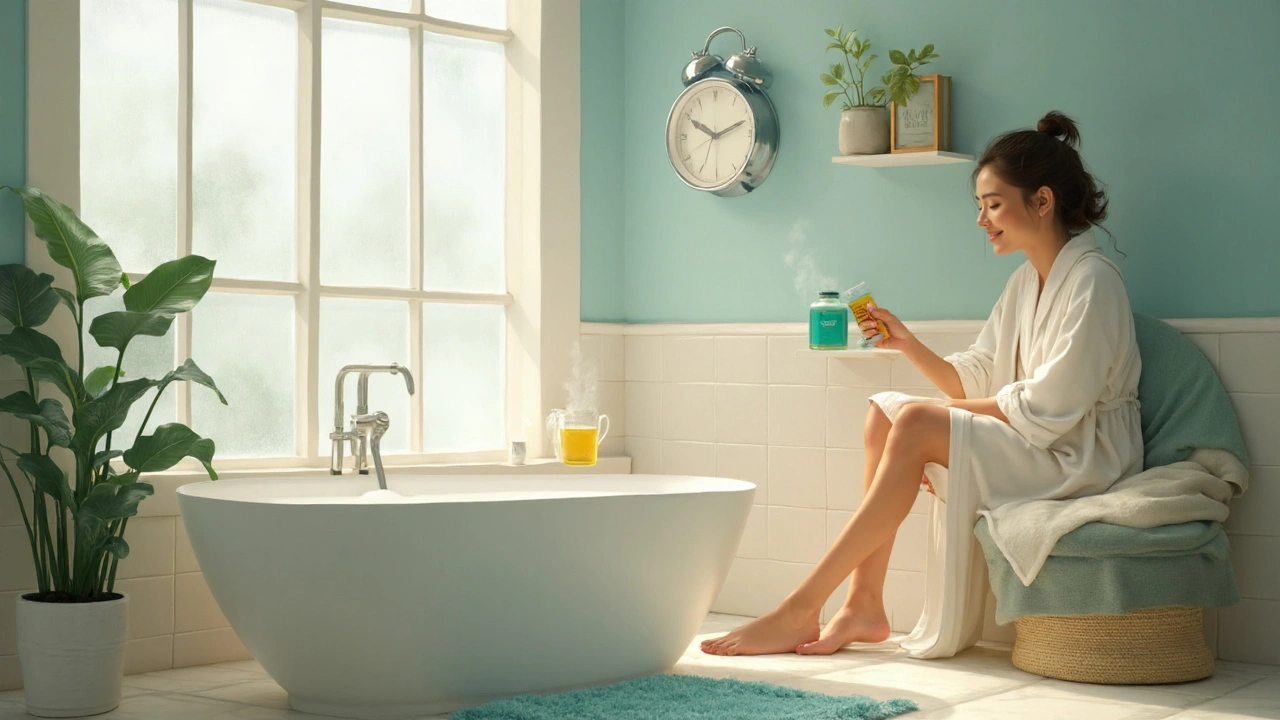Bladder Spasms & Diet: Top Supplements to Calm Your Bladder
 Sep, 24 2025
Sep, 24 2025
Bladder spasms are involuntary, painful contractions of the detrusor muscle that line the bladder wall. They often show up as a sudden urge to urinate, sharp pelvic pain, or leaking. While medications exist, many people turn to diet and supplements to tone down the over‑active signals.
Why Nutrition Matters for the Urinary Tract
The bladder doesn’t operate in a vacuum. What you drink, the minerals you absorb, and the bacteria living in your gut all influence the urinary tract. A balanced diet keeps the detrusor muscle responsive but not hypersensitive. Excess caffeine, alcohol, or artificial sweeteners can overstimulate nerves, while a deficit in magnesium or vitamin D can weaken muscle relaxation.
Supplement #1: Magnesium
Magnesium is a mineral that supports over 300 enzymatic reactions, including muscle relaxation. In the bladder, it helps the detrusor relax after a contraction, reducing the frequency of spasms. Clinical reviews show that daily doses of 300‑400mg of magnesium citrate can lower urgency episodes by about 20% in adults with overactive bladder symptoms.
- Typical dose: 300‑400mg magnesium citrate per day
- Key benefit: Improves smooth‑muscle relaxation
- Side effects: Diarrhea at high doses, mild stomach upset
Supplement #2: Omega‑3 Fatty Acids
Omega‑3 fatty acids (EPA and DHA) are anti‑inflammatory nutrients found in fish oil and algae. Inflammation of the bladder lining can sensitize nerves and trigger spasms. A 2023 double‑blind trial with 150 participants found that 1g of combined EPA/DHA daily reduced nocturnal urgency by 15%.
- Typical dose: 1g fish oil (EPA+DHA) per day
- Key benefit: Lowers inflammatory mediators
- Side effects: Fishy aftertaste, rare mild bleeding risk at very high doses
Supplement #3: Cranberry Extract
Cranberry extract supplies proanthocyanidins that prevent bacteria from adhering to bladder walls. Even when infection isn’t present, a low‑grade bacterial load can irritate the bladder and provoke spasms. Studies on women with recurrent urgency show that 500mg standardized extract daily cuts symptom scores by roughly one third.
- Typical dose: 500mg standardized extract (70% proanthocyanidins) per day
- Key benefit: Reduces bacterial adhesion
- Side effects: Mild gastrointestinal upset in sensitive individuals
Supplement #4: D‑Mannose
D‑Mannose is a simple sugar that blocks E.coli from sticking to the urothelium. While it’s best known for preventing UTIs, a clear bladder surface also means fewer irritation spikes that can trigger spasms. A 2022 pilot study gave 2g twice daily to 60 patients; 45% reported fewer urgency episodes after four weeks.
- Typical dose: 2g twice daily
- Key benefit: Prevents bacterial colonisation
- Side effects: Rarely causes loose stools if taken in excess
Supplement #5: Probiotics
Probiotics (especially Lactobacillus rhamnosus and L. reuteri) help maintain a healthy vaginal and gut microbiome. A balanced microbiome reduces the chance of pathogenic bacteria migrating to the bladder and keeps inflammation in check. Meta‑analyses of 12 trials show that a daily dose of 10billion CFU improves urinary symptoms in up to 30% of users.
- Typical dose: 10billion CFU of Lactobacillus strains per day
- Key benefit: Supports microbiome balance
- Side effects: Temporary gas or bloating

Supplement #6: Vitamin D
Vitamin D modulates immune response and smooth‑muscle function. Low serum 25‑OH‑vitamin D levels (<20ng/mL) have been linked to higher rates of overactive bladder. Supplementing to achieve 30‑50ng/mL can reduce urgency episodes by 10‑12%.
- Typical dose: 1000‑2000IU daily, adjusted to blood levels
- Key benefit: Improves muscle tone and immune regulation
- Side effects: Hypercalcemia only at very high intakes
Putting It All Together: A Practical Supplement Plan
Not every supplement works for everyone. Here’s a step‑by‑step guide to test what fits your body:
- Start with magnesium for three weeks. Track urgency episodes in a simple notebook.
- If improvement is modest (<10% reduction), add omega‑3 for another four weeks.
- For those prone to infections, introduce cranberry extract or D‑mannose-pick one and monitor bacterial signs (e.g., cloudy urine).
- Consider probiotics if you’ve taken antibiotics recently or notice gut upset.
- Check your vitamin D level with a blood test; supplement only if below 30ng/mL.
Always consult a healthcare professional before combining supplements, especially if you’re on prescription anticholinergics or diuretics.
Comparison of the Top Supplements
| Supplement | Typical Dose | Evidence Strength | Main Benefit | Common Side Effects |
|---|---|---|---|---|
| Magnesium | 300‑400mg citrate daily | Moderate (RCTs & meta‑analysis) | Muscle relaxation | Diarrhea, stomach upset |
| Omega‑3 (EPA/DHA) | 1g fish oil daily | Moderate (double‑blind trial) | Anti‑inflammatory | Fishy aftertaste, mild bleeding risk |
| Cranberry Extract | 500mg (70% PAC) daily | Low‑to‑moderate (small RCTs) | Prevents bacterial adhesion | GI upset |
| D‑Mannose | 2g twice daily | Low (pilot study) | Blocks E.coli stickiness | Loose stools if excess |
| Probiotics (Lactobacillus) | 10billion CFU daily | Moderate (meta‑analysis) | Microbiome balance | Gas, bloating |
| Vitamin D | 1000‑2000IU daily | Low‑to‑moderate (observational) | Muscle tone & immunity | Hypercalcemia (rare) |
Related Concepts: Lifestyle Tweaks That Complement Supplements
Supplements work best when the rest of your routine isn’t sabotaging them. Here are three low‑effort changes:
- Hydration timing: Aim for 1.5‑2L of water split across the day, but finish large intakes at least two hours before bedtime to avoid nocturnal urgency.
- Caffeine & alcohol moderation: Limit caffeine to 200mg (about one strong coffee) and alcohol to a single standard drink on days when symptoms flare.
- Pelvic floor awareness: Gentle Kegel exercises performed twice daily can improve bladder control by strengthening the sphincter without over‑tightening the detrusor.
When you combine these habits with the right supplement stack, many users report a noticeable drop in both frequency and intensity of spasms.
Potential Pitfalls and When to Seek Professional Help
Even natural approaches have limits. Watch for red flags that indicate a deeper issue:
- Persistent burning or blood in urine - could signal infection or stones.
- Sudden onset of severe pain - may be a sign of interstitial cystitis or bladder cancer.
- Symptoms that worsen despite optimal supplement dosing - consider urodynamic testing.
If any of these appear, schedule a review with a urologist or a pelvic‑floor physiotherapist. Supplements should complement, not replace, professional diagnosis.
Next Steps for the Curious Reader
Now that you’ve seen the evidence, you can pick a starter supplement, set a tracking sheet, and reassess after 4‑6 weeks. Future articles in this cluster will dig deeper into:
- “Overactive Bladder vs. Interstitial Cystitis: How to Tell the Difference”
- “The Role of Anticholinergic Medications in Bladder Health”
- “Yoga Poses That Strengthen the Pelvic Floor”
Those pieces will expand the broader topic of urinary health while offering narrower, actionable guides.

Frequently Asked Questions
Can magnesium alone stop bladder spasms?
Magnesium often reduces the frequency and intensity of spasms, but its effect varies. Many people see a 10‑20% improvement; severe cases may need additional support from anti‑spasmodic meds or other supplements.
Is it safe to take fish oil if I’m on blood thinners?
High doses of omega‑3 can mildly increase bleeding time. Keep fish oil under 1g per day and discuss the plan with your doctor if you’re using warfarin, aspirin, or similar drugs.
How long should I try a supplement before deciding it works?
Give each supplement at least three to four weeks at the recommended dose. Track urgency episodes, nighttime trips, and pain levels. If there’s no measurable change after that period, consider switching or adding another agent.
Do probiotics help if I don’t have recurrent UTIs?
Yes. Probiotics improve the overall microbial balance, reducing inflammation that can sensitize the bladder. Even without frequent infections, many users notice fewer urgency episodes after a month of daily Lactobacillus.
What’s the best time of day to take magnesium?
Most people take magnesium in the evening because its calming effect can aid sleep and reduce nighttime bladder activity. Split dosing (morning and night) works if you experience daytime spasms too.
Can I combine cranberry extract with D‑mannose?
Yes, they act on different mechanisms - cranberry prevents bacterial attachment, while D‑mannose blocks E.coli binding sites. Using both is common in prevention protocols and is generally well‑tolerated.
Should I get my vitamin D level checked before supplementing?
It’s advisable. A simple 25‑OH‑vitamin D blood test tells you whether you need supplementation and helps you choose the right dose to reach the optimal 30‑50ng/mL range.

Rohan Puri
September 24, 2025 AT 13:43my bladder doesn't care if i take magnesium or not
i just hold it longer and drink less coffee
Mandeep Singh
September 26, 2025 AT 09:47we used to fix this with turmeric and warm water
now we need 6 different pills and a lab report
Chris Bellante
September 28, 2025 AT 01:16supplemental magnesium modulates calcium flux at the sarcolemma
but let's be real - most folks just want a quick fix without changing their 3pm soda habit
Nicole Manlapaz
September 29, 2025 AT 21:05also swapped my diet soda for sparkling water and my nighttime trips dropped from 5 to 1 😭
Frederick Staal
October 1, 2025 AT 03:38This article is dangerously reductive.
None of these supplements have FDA approval for this indication.
And the study cited on omega-3? Power analysis was underpowered, p-value borderline, and the manufacturer funded it.
Also, vitamin D deficiency is not a root cause - it's a biomarker of systemic inflammation.
Stop pushing pseudoscientific band-aids.
erin orina
October 2, 2025 AT 12:01probiotics changed my life honestly
also low carb helped so much
you got this!! 💪❤️
Lisa Uhlyarik
October 3, 2025 AT 05:04you think a pill fixes your bad habits
you drink soda all day eat sugar sleep 4 hours and then pop some cranberry extract like it's magic
the real problem is you're lazy and addicted to toxins
Kelley Akers
October 4, 2025 AT 00:15None of this is peer-reviewed to any meaningful standard.
And vitamin D? You're implying deficiency causes spasms - that’s a correlation, not causation.
Also, where's the control group data?
Cameron Perry
October 5, 2025 AT 05:23it actually helped with my weird after-urination tingle
not 100% but better than before
anyone else notice that?
Peggy Cai
October 5, 2025 AT 13:35you're not broken you're just living in a toxic world
but sure take your 2g of d-mannose and call it healing
Taylor Smith
October 7, 2025 AT 06:54no more midnight runs
and i didn't even notice the change until my partner said 'you're not getting up at 3am anymore'
weird how that works
Tammy Cooper
October 7, 2025 AT 18:31and honestly the only one that did anything was the magnesium
the rest were just expensive pee-flavoring
also i think my bladder is just mad at me for being a human
Nicole Manlapaz
October 8, 2025 AT 06:37you're the first person who didn't tell me to 'just drink more water'
you actually get it
i've been on this journey for 7 years and you're the first one who didn't make me feel broken
thank you
Jill Amanno
October 9, 2025 AT 16:45supplements are a temporary ceasefire with chaos
the bladder doesn't care about your willpower or your vitamin D levels
it just wants you to stop drinking diet coke at midnight
but you won't
so you buy the pills
and then you feel guilty
and then you buy more pills
and the cycle continues
we're all just trying to outsource responsibility to chemistry